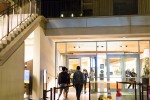Finding study spaces at UCLA is always difficult: dorm lounges aren’t ideal for study groups because you might bother others present; private study rooms in Rieber Court and Covel Commons have to be scheduled well in advance, especially with midterms fast approaching; and libraries are typically overcrowded and present similar scheduling issues.
UCLA has a solution to this: Since students love the dining halls so much, why not just let them come back after they close and study there?
UCLA Residential Life and UCLA Dining unveiled a new collaborative program this quarter that allows students to study in Feast and Bruin Plate dining halls from 10 p.m. to 2 a.m., said Charles Wilcots, associate director of UCLA Dining Services. The study spaces are open to all students with a BruinCard, and offer free coffee and tea.
While UCLA Dining and ResLife are off to a good start, they still need to work out the details on how the program will continue in the future.
ResLife student workers are currently responsible for proctoring these late night study spaces, Wilcots said. This is in addition to student workers having to juggle many responsibilities. Furthermore, there is no way to access information about the study spaces online, which could leave students unaware of the existence of these study spaces.
UCLA Dining and ResLife need to quickly iron out how they plan to continue the dining hall study program. These details should include planning for how to hire permanent staffers to proctor the study spaces and creating an online schedule that lets students know when the study spaces are open.
Students and administrators have recently ramped up efforts to create new study spaces. For instance, Pauley Pavilion was turned into a temporary study space during finals week of fall quarter.
This is because UCLA’s student population is steadily growing, so there will inevitably be overcrowding. UCLA admitted around 6,500 people for the 2016-2017 year alone. And in 2015, about 96 percent of first years lived on campus. Offering more study spaces can help ensure students don’t have to worry about finding a quiet place to focus.
Krysten Schmidt, third-year applied mathematics student, said that The Study at Hedrick is always full, so having these new study spaces is great. She said it’s quiet and easy to find a place to sit.
“Assuming this (program) stays, it’ll probably be my go-to (study place),” she added.
Even students who don’t live on the Hill seem inclined to use the new study spaces.
Jasper Wu, a second-year economics student, said he prefers using the new dining halls study spaces because they are a lot closer to his apartment, so he doesn’t have to walk as far to reach the library.
Maya Hashimoto, a third-year molecular cell and developmental biology student, also appreciates the convenience of study space spaces on the Hill.
Studying at the dining hall study areas is the most convenient because she lives off campus so she is unable to use the study rooms in residential halls, Hashimoto said.
Because the program is so new, though, there isn’t a clear idea of how it will run next quarter. While UCLA Dining will make the space available, how the space will be used is still unknown. So far, all we know is that the program will continue in the future.
“We’re committed to this program, in terms of space, for our students this academic year as well as next academic year,” Wilcots said.
Wilcots said it’s a little early to determine the frequency of space utilization. Future costs of the program aren’t yet determined because the number of student attendees for the spaces is still being gathered by ResLife.
Despite these uncertainties, ResLife and UCLA Dining can still do a fair amount of preplanning. For example, ResLife can plan to create positions for permanent proctors who are assigned solely to the study hall spaces and can be more readily available to answer any questions that might arise.
And by adding the future schedule of the program online, students can better coordinate their own schedules. Schmidt said her friends only heard about the new study space through word of mouth, not through any online or physical promotion. These are outreach issues UCLA can address.
Although the program is new and specifics aren’t to be expected, students are already taking part in this program. Continuing the study spaces will require UCLA to figure out ways to keep proctors from being exhausted and students from missing out on the program. Waiting until later to organize or plan things out isn’t the most efficient way to keep the program running.
Students don’t need to go through the torment of walking up Janss Steps to get to Powell Library. They can ease the misery of studying for midterms in the comforts of Feast, cup of free coffee in hand – so long as the details of the new dining hall study program get ironed out.
